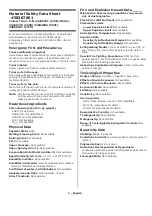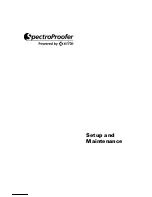
4. Release the blade release button. Check for securely
held blade.
To rip Romex
®
,
hold the knife securely.
(RKT-21 only)
1. Insert cable through the ripping station
2. Twist your wrist to force the ripping blade
to penetrate cable jacket.
3. Apply a steady force of the knife toward the free
end of the cable.
To strip wire,
hold the knife securely.
(RKT-21 only)
1. Slide the blade button down and back
2. Place wire in stripping station
3. Slide the blade button down and forward against wire.
4. Pull wire out against blade to strip wire.
ESPECIFICACIONES
Tipo de hoja:
Sirve para la mayoría de las hojas estándar en la industria
Baterías:
El modelo CAM-10 usa 2 baterías de botón LR44
Rango operativo:
50-600 VCA, 50-60 Hz
Indicadores de voltaje:
Alerta sonora y visual
Temperatura operativa:
0-50°C
Humedad:
80% HR máxima, 50% HR máxima sobre 30°C
Altitud:
Hasta 2000 metros.
Seguridad:
Para uso en interiores y conforme a la categoría III de sobrevoltaje
Grado de contaminación 2. IEC 529, IEC 1010
Uso previsto:
Detección de voltaje CA sin contacto
LIMPIEZA
Use un paño limpio y seco. No use ningún tipo de solvente.
ANTES DEL USO
LEA TODAS LAS INSTRUCCIONES OPERATIVAS ANTES DEL USO.
SÓLO PARA EL USO PREVISTO.
!
ADVERTENCIA:
Las hojas son muy filosas. Maneje con cuidado este
producto y las hojas de repuesto o reemplazo. Las hojas pueden quebrarse y
causar lesiones. Use ropa protectora.
ADVERTENCIA:
SIEMPRE use anteojos de seguridad al utilizar este producto.
!
ADVERTENCIA:
Nunca use la cuchilla en circuitos eléctricos energizados ni
cerca de ellos.
ADVERTENCIA:
Son peligrosos los circuitos de CA y CC de alto voltaje.
Tenga sumo cuidado y utilice de la manera prevista al probar circuitos
potencialmente energizados. Riesgo de electrocución.
ADVERTENCIA:
Este probador no detecta el voltaje en cables que tienen
blindaje eléctrico mediante portacables de metal o cierres puestos a tierra.
Riesgo de electrocución.
OPERACIÓN
Antes de usar, pruebe las baterías del probador CAM-10 oprimiendo el botón
en el probador que está marcado PRESS. Un tono audible momentáneo y un
destello de luz son indicaciones de que la unidad está funcionando.
ADVERTENCIA:
Siempre pruebe en un circuito energizado conocido antes
de usar.
Para probar el voltaje:
1. Sostenga la cuchilla con el pulgar en el botón del probador CAM-10
marcado PRESS, manteniendo las manos y los dedos bien alejados del
sensor (extremo rojo).
2. Oprima y mantenga así el botón de prueba en el probador. Una alerta
momentánea indica que la unidad está funcionando.
Limited Lifetime Warranty limited solely to repair or replacement; no warranty or
merchantability or fitness for a particular purpose. Product is warrantied to be free
of defects in materials and workmanship for the normal life of the product. In no
event shall Gardner Bender be liable for incidental or consequential damage.
RKT-10, RKT-20, RKT-21
Electrician’s Knives
CAM-10
Non-contact Voltage Tester
OPERATING
INSTRUCTIONS
Patents Pending
RKT-10, RKT-20, RKT-21
Cuchilla de electricista
CAM-10
Probador de voltaje sin cantacto
INSTRUCCIONES
OPERATIVAS
Patentes pendientes
SYMBOLS
32-122°F (0-50°C)
0°F (-18°C) to 156°F (70°C)
SPECIFICATIONS
Blade Type:
Fits most industry standard blades
Batteries:
CAM-10 Use 2 LR44 button cell batteries
Operating Range:
50-600 VAC, 50-60 Hz
Voltage Indicators:
Audible & Visual Alert
Operating Temperature:
Storage Temperature:
Humidity:
80% RH maximum below 86˚F(30˚C), 50% RH maximum above 86°F (30°C)
Altitude:
Up to 6561 feet (2000 meters)
Safety:
For indoor use and in accordance with over voltage category III, Pollution degree 2
Intended Use:
Non-contact AC voltage detection
Serial No:
See interior of battery cover
CLEANING
Use clean, dry cloth. Do not use any type of solvent.
BEFORE USE
READ ALL OPERATING INSTRUCTIONS BEFORE USE. FOR INTENDED
USE ONLY.
Protection provided by this product may be impaired if used with
accessories not provided by the manufacture or if used as in a manner other
than specified within.
!
WARNING:
The blades are very sharp. Handle this product and spare or
replacement blades with care. The blades may break and cause injury. Wear
protective clothing.
WARNING:
ALWAYS wear safety goggles when using this product.
!
WARNING:
Never use knife on or near live electrical circuits.
WARNING:
To be used by trained person only. High voltage AC and DC
circuits are dangerous. Use extreme caution and use as intended when
testing potentially live circuits. Risk of Electrocution.
WARNING:
This product should be used to test or detect insulated wires and
terminals but should not be used to contact Live Circuits. This tester
will not detect voltage in wires that are electrically shielded by metal conduit
or grounded enclosures. Risk of Electrocution.
OPERATION
Before use, test the batteries of the CAM-10 tester by pressing the button on
the tester marked PRESS. A momentary audible tone and flash of the light are
an indication that the unit is working.
WARNING:
Always test on known live circuit before use.
To test for voltage:
1. Hold the knife with your thumb on the CAM-10 tester
button marked PRESS, keeping hands and fingers
well away from the sensor (red end).
2. Press down and hold the test button on the tester.
A momentary alert indicates the unit is working.
3. Place the sensor (red end) near the wire or device
to be tested. Maintain a minimum distance of
0.5mm from contacting the wire or device to
be tested. If voltage greater than 50 VAC is
present, the tester light and tone will activate
rhythmically at 10 to 15 cycles second.
CAM-10 BATTERY REPLACEMENT
Remove the Phillips
®
head screw from the bottom of the CAM-10 tester.
Lift off the battery cover from the top of the tester. Insert 2 LR44
batteries in the orientation indicated on the side of the battery
cover. Replace cover and screw.
To change the blade,
hold the knife securely.
1. Slide the blade button down and forward.
2. Press and hold the blade release button
3. Remove blade. Rotate blade 180° for reuse or
insert a new blade.
To detach the tester
from the knife, apply force
to the tester near the Gardner Bender logo and
slide the tester from the holding slot. The tester
can be used to test for voltage after it is detached
per instructions within. Hold the tester as shown,
keeping hands and fingers well away from
the sensor (red end).
This equipment has double insulation with respect to live circuits
Attention, consult the accompanying documents
!
!




















